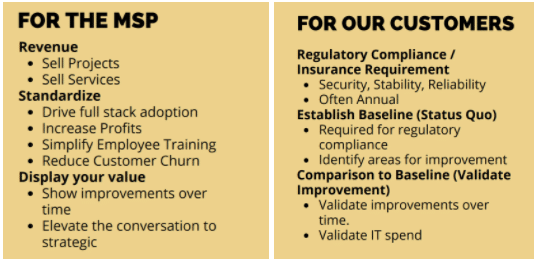
Looking for ways to deliver assessments as unique as your MSP?
Your vCIO process is what drives your customer journey and their success. You need tools that allow you to manage your process but not mandate it.
Take assessments for example. Assessments bring a lot of value to your MSP and to your clients.

(for more on this, download our Value of Assessments article and PreSales Assessment template here: https://wpstage.lifecycleinsights.io/assessmints)
There are many types of assessments that allow MSPs to drive value, sales and process throughout the customer journey. There are also opportunities for MSPs to improve their own practices with internal assessments. Here are some ways our partners use assessments to maximize their customer experience:
External Assessments
- MSP Strategic Technology Assessment:
Typically the first assessment our partners consider is a strategic business review assessment. With categories including (but not limited to – don’t forget that flexibility is key so every MSP can make it their own):
- Hardware
- Business Applications/Software
- Security
- Continuity
- Policy and Procedure
- Regulatory Compliance
2. Cybersecurity/Risk Assessments:
From NIST 800/171 to CIS 20 to CMMC and beyond, there is no shortage of cybersecurity assessments that become increasingly critical each day. Many MSPs are using 8-10 high level cybersecurity items as a lead generation assessment to grab the attention of prospects. Once they have engagement and an understanding of the concerns, the MSP can propose a full-scale assessment (that either they perform or outsource to a security organization that brings findings back to them in order to propose remediation projects to their clients). Tracking progress on these items regularly provides peace of mind to all parties involved.
3. Industry/regulatory compliance:
Similar to security assessments, many industries regulate that specific verticals follow mandates around compliance (eg. HIPAA). MSPs in these verticals often assess compliance and address remediation steps (Project work!). However, many outsource these comprehensive assessments, as well, in order to focus on their processes and sell remediation services around identified risk.
4. Technology Stack Assessments:
Technology Stack Assessments provide as much value for the client as for the MSP. Having all clients following the MSP’s process and adopting the MSP’s tool stack will reduce costs and downtime. It speeds up help desk tickets, allows for easier employee training and reduces churn.
5. PreSales Assessment:
A presales assessment helps show the prospect where their current technology might be causing pain and helps to set a baseline. This way the MSP can visibly show how they will add value by improving the organization’s technology health right out of the gate. Presenting a presales assessment also establishes in the client’s mind what it is like to work with the MSP (Customer Experience/Journey). Setting the stage to be a strategic partner naturally leads toward future business reviews.
Internal Assessments:
6. Internal Audit:
“Do as I say not as I do” is not a solid business mantra. It is becoming apparent that many MSP breaches are a result of some combination of poor password hygiene and failure to protect key systems with MFA. MSPs need to run internal audits on their own processes to make sure they are aligned with best practices around security and compliance. If they were doing internal audits, MSPs would identify and remediate risks and gaps in their processes and make themselves less easy targets.
7. Checklist:
Documenting processes is one of the hallmarks of managed services. We have seen partners develop checklists for activities such as server replacement projects inside Lifecycle Insights in order to ensure all of the checks and balances are in place.
8. Customer Health:
While customer health metrics vary from quantitative to qualitative, being able to report on them in one place with color-coding allows MSPs to quickly identify at-risk clients helping to reduce churn and ensure their customer base remains raving fans!
For most MSPs, preparing assessments is not only time consuming but tedious work. It involved building out and maintaining spreadsheets, how-to docs, and a significant amount of time preparing the client deliverables so that they appear professional and actionable. By adopting an assessment platform, MSPs can standardize the delivery process and significantly cut the amount of time invested, while taking advantage of assessment content to increase project revenue.
If you want to know more about how an assessment platform can help you increase revenue, reach out for a consultation and free trial today.

